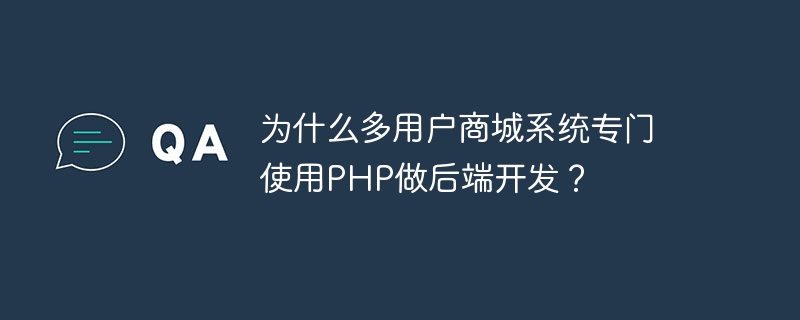

Why do multi-user mall systems specifically use PHP for back-end development?
With the rapid development of the e-commerce industry, the mall system has become an essential tool for many enterprises. The multi-user mall system meets the needs of multiple merchants to settle and manage. When developing a multi-user mall system, choosing the right back-end development language is crucial. As a language widely used in web development, why has PHP become the first choice for multi-user mall systems? This article explores this issue and provides some relevant code examples.
The following is a simple PHP code example to handle the function of user registration:
<?php
// 接受表单提交的数据
$username = $_POST['username'];
$password = $_POST['password'];
// 对密码进行加密处理
$hashedPassword = password_hash($password, PASSWORD_DEFAULT);
// 连接数据库并插入新用户数据
$conn = new mysqli("localhost", "username", "password", "database");
$sql = "INSERT INTO users (username, password) VALUES ('$username', '$hashedPassword')";
$result = $conn->query($sql);
// 根据插入结果返回相应的信息
if ($result) {
echo "用户注册成功!";
} else {
echo "用户注册失败!";
}
?>The following is a simple PHP code example for the function of getting a user list:
<?php
// 连接数据库获取用户列表
$conn = new mysqli("localhost", "username", "password", "database");
$sql = "SELECT * FROM users";
$result = $conn->query($sql);
// 将用户列表转化为JSON格式并返回
$users = array();
while ($row = $result->fetch_assoc()) {
$user = array(
'id' => $row['id'],
'username' => $row['username'],
'email' => $row['email']
);
array_push($users, $user);
}
echo json_encode($users);
?>In summary, choosing PHP as the back-end development language for a multi-user mall system has several obvious advantages. Open source, easy to learn, and abundant resources and documentation make PHP an ideal choice for handling complex mall system functions. Of course, choosing an appropriate back-end language should also be comprehensively considered based on actual needs and the technology stack of the development team.
The above is the detailed content of Why do multi-user mall systems specifically use PHP for back-end development?. For more information, please follow other related articles on the PHP Chinese website!